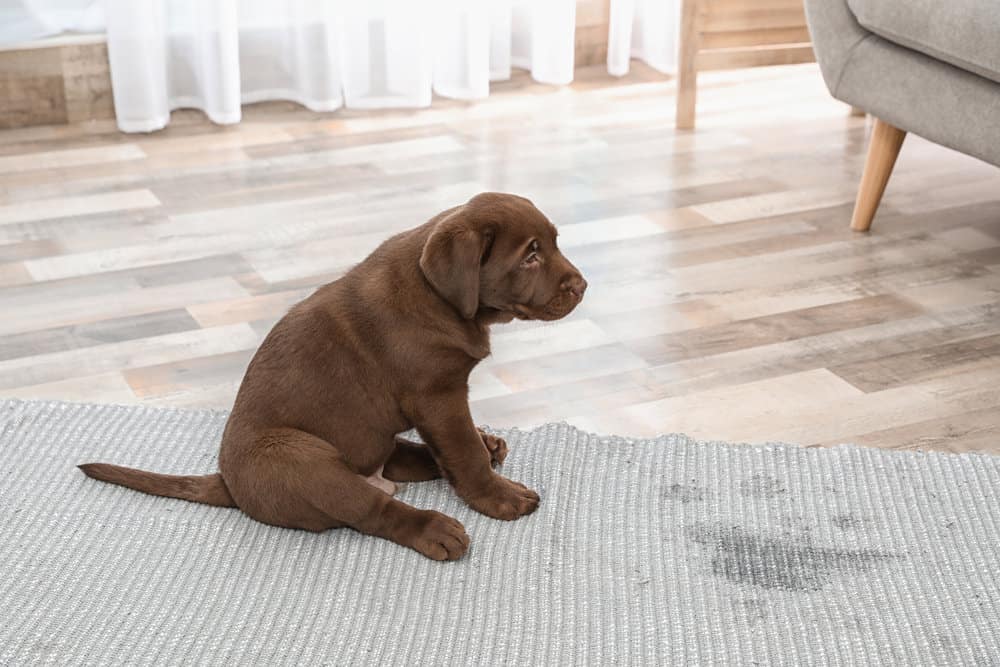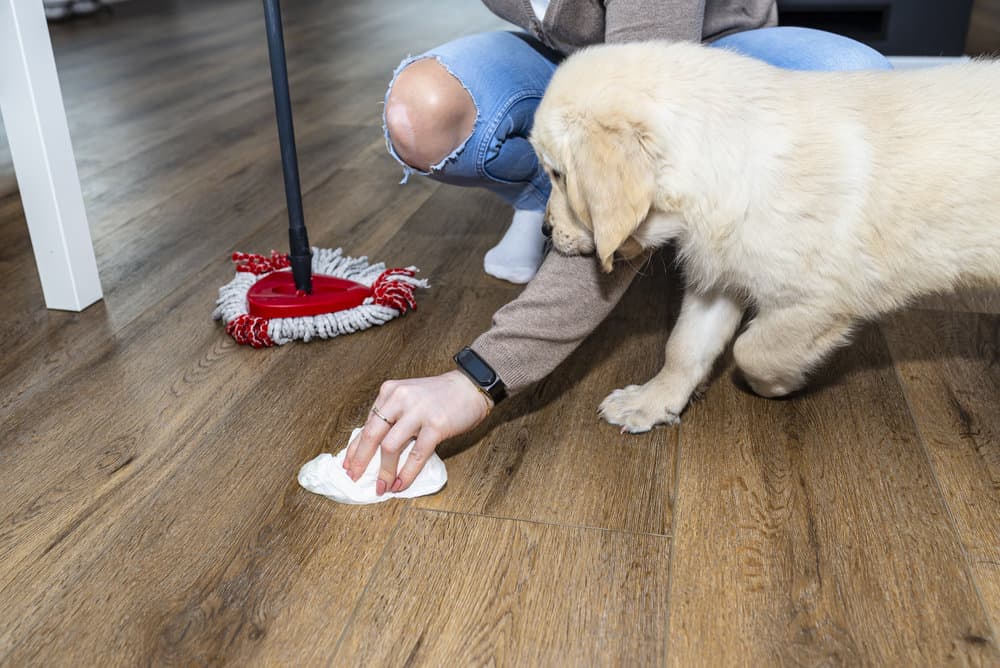When I first started raising my pup, I vaguely remember stressing about his increased urination. It was as frustrating as it was concerning. I had thought to myself, “Why is my puppy peeing every 5 minutes? Is he ok? What am I doing wrong?”
After much research, I found several reasons that can explain a puppy's increased bathroom breaks. Some are caused by anxiety, incorrect training, and attention-seeking behavior, while others are more health-related: UTIs, diabetes, kidney infections, and medication side effects.
5 Health Issues That Can Cause Increased Urination
Increased urination is often a side-effect of the following conditions:
- Urinary Tract Infection (UTI)

If you've had a UTI before, you already know how frequently it causes a person to urinate. The same thing happens with dogs.
UTI in dogs is a common condition that occurs when bacteria enters a dog’s urinary tract through the urethra. It causes infection and inflammation, which in turn results in strong and frequent urges to urinate.
Luckily, this condition is relatively easy to fix with the right medication. The earlier it’s checked out, the faster it’s resolved.
Alongside frequent urination, symptoms associated with UTI include the following:
- Incontinence
- Straining to urinate
- Blood in urine
- Dripping urine
- Painful urination (i.e., crying out or whining when peeing)
- Frequent licking of the genitals
- Dark, cloudy, or foul urine
- Increased thirst
- Generalized weakness
- Diabetes
Though not as common as in older dogs, diabetes in puppies is possible.
Canine diabetes is much like human diabetes: it's caused by a lack or inadequate biological response to insulin.
The pup's body would be unable to regulate blood sugar levels, and thus have abnormally high levels of sugar in their blood.
Canine diabetes is one of the most frequent causes of increased urination in dogs.
Dogs with diabetes don't necessarily pee every five minutes, but they’ll certainly take more potty breaks than normal.
This is because the condition forces their kidneys to work overtime to flush out excess sugar in their blood, which is expelled through the urine.
Here are the symptoms to watch out for in diabetes:
- Increased thirst
- Increased urination
- Weight loss, despite the increase in appetite
- Decreased appetite
- Cloudy eyes
- Recurrent UTI
- Cataract formation
- Poor coat and skin quality
- Vomiting
Helpful Dog Training Resource:
For help with training your dog, you should take a look at The Online Dog Trainer by Doggy Dan. Doggy Dan is an expert Dog Trainer based in New Zealand. His online resource contains Hundreds of Excellent Dog Training Videos that will take you step-by-step through the process of developing a healthy, happy well-behaved dog.
- Kidney Infection
Kidney infections, particularly pyelonephritis, share much the same symptoms as UTIs as it falls under the same category. It occurs when bacteria travels in a dog's urethra or bladder to one or both kidneys.
Like diabetes, pyelonephritis isn't limited to middle-aged or older dogs. It can happen to puppies, too, especially if their parents have a history of kidney disease.
Pups with pyelonephritis have compromised kidney filters, which can cause an increased urge to pee. It can also cause incontinence and bed wetting.
Symptoms include:
- Excessive thirst
- Reduced appetite
- Vomiting
- Generalized weakness or discomfort
- Side pain
- Difficulty urinating
- Foul-smelling urine
- Blood in urine
- Medications
Some medications can cause a pup to urinate more frequently.
Furosemide and Prednisone, for example, have increased thirst as a side effect, which can lead to urinary incontinence and frequent urination.
Certain antibiotics and steroids can also cause the same effect, especially if taken over long periods of time.
If you've recently given your pup medication, check with your vet to see if frequent urination is an expected side effect.
- Inability to Control Bladder

This isn’t necessarily a medical reason, but it still falls in the physical aspect of the topic.
Very young puppies don't have the ability to control their bladder, so they'd pee whenever and wherever they want. They'd even pee on themselves while asleep. Since puppies drink a lot more liquids when they're young, they pee a lot more, too.
Puppies should be housetrained between 12 weeks and 16 weeks old. At that point, they'd have full control of their bladder and know how to hold their pee until they're allowed outside.
Helpful Dog Health Resource:
Note: Our Health is #1 Priority. It should be no different for your dog. But you need to help him. The Ultimate Guide to Dog Health is the answer. This handy guide will help you recognize the symptoms of the health problems above. Get the knowledge to stay ahead of these terrible issues that can rob your lovely dog from vigor and life. Help your friend make it to 14 yrs+ without pain and suffering.
3 Behavioral Issues That Can Cause Increased Urination
Increased urination isn't necessarily a sign of a physical condition or disease. It could also be caused by emotional or behavioral issues, such as:
- Anxiety
Rehomed, adopted, or traumatized pups can show signs of stress and anxiety, which can manifest in increased peeing.
This is especially common in small breeds such as Pomeranians, Chihuahuas, and Maltese. They'd pee whenever anxious or nervous.
Though less dangerous than medically induced reasons, anxiety in pups can be challenging to cure, particularly if the pup came from an abusive or neglectful household. It can take weeks to fix, if not months.
Luckily, most dogs respond to TLC. With enough patience, love, and behavioral training, an anxious pup can transform into a playful, active pup.
Here are some signs of anxiety in puppies:
- Excessive howling, whining, or barking
- Panting
- Shivering
- Cowering or hiding in a secluded spot
- Destructive behavior like destroying furniture
- Unintentional self-harm, like chewing or licking
Attention-Seeking Behavior

Puppies are a lot like human babies: they crave attention!
If they're not given enough attention, they may display unwanted behavior like destroying furniture, loud barking/howling, excessive begging, and peeing wherever they like, whenever they like.
The latter can result in frequent urination when they receive the attention they want from their owners.
Puppies become attention-seekers for many reasons, including not getting enough exercise, mental stimulation, or positive attention from their owners.
Puppies that are left alone for long periods of time become clingier when their owners are home, which can appear as attention-seeking behavior.
The best way to prevent unwanted attention-seeking behaviors like frequent urination is to simply ignore the pup's unwanted behaviors.
Avoid yelling or punishing the pup as this may further worsen the behavior.
Also, increase environmental enrichment! Regularly take your dog out for walks and play.
If you don't have the time, bring him to doggy daycare so he can play with other dogs.
You can also buy him stimulating toys like food puzzles.
Incorrect Training
Your pup might be peeing every five minutes because he isn't properly housetrained.
Housetraining greatly depends on routine.
If you take your pup out to pee randomly throughout the day, he won't be able to train his bladder to pee at appropriate times.
You should develop a regular schedule so he'll understand where and when peeing is appropriate.

Paul has been creating content for the dog niche for many years. The information he shares comes his first hand experience growing up in dog lovers household and then owning multiple dog breeds of his own as an adult. Paul enjoys doing the hard research to collect, analyze and present our dogtemperament.com readers with the best answers to their questions.